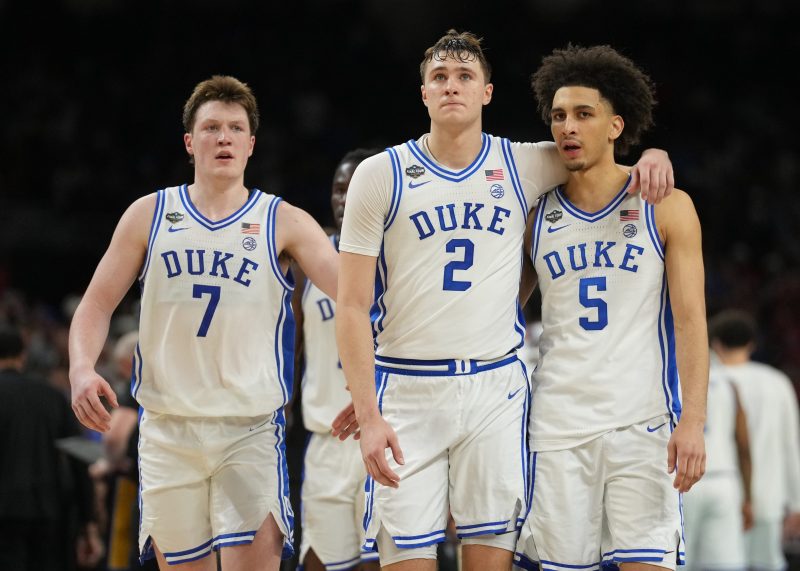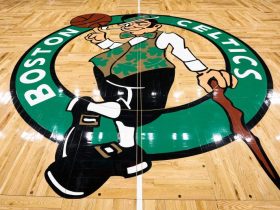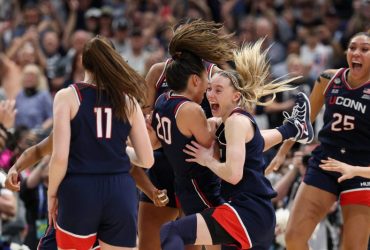Correction: A previous version of this story misstated the run Houston finished the game with.
SAN ANTONIO — The lead was nine points with 2:15 remaining, and even as Duke struggled to convert on the offensive end there was no thought given to the idea the Blue Devils might actually lose to Houston in this battle of No. 1 seeds in the national semifinal at the Final Four.
The lead was down to seven points with 1:26 to play. To six points at the 42-second mark. Again, the very idea the Blue Devils’ season would end before the national championship game was ridiculous, ludicrous, preposterous.
But it’s called March Madness for a reason. Trailing 64-55, Houston outscored Duke 15-3 over the final two-plus minutes to reach Monday night’s matchup against Florida. No team had ever given away so much in so little time on college basketball’s biggest stage.
“You go from some of the most special moments in the tournament to the most heartbreaking loss,” Duke coach Jon Scheyer said. “It’s heartbreaking. It’s incredibly disappointing. There’s a lot of pain that comes with this. That’s what the tournament is all about. You’re an inch away from the national championship game.”
Given the stakes, the names involved and the seemingly unavoidable Duke win, what unfolded over these final 135 seconds might be the most stunning stretch in Final Four history. How it’s seen depends on the point of view: To Duke, it’s an epic meltdown without precedent in program history; to Houston, it’s a classic comeback that helps erase generations of Final Four failures.
“At some point, if you have a culture, quitting is not part of the deal,” said Houston coach Kelvin Sampson. “We’re not going to quit. We’re just going to play better.”
What happened is easily definable. The Blue Devils were in control, and then they weren’t. The Cougars hammered away, pelting Duke with body blow after body blow, and put themselves in position to deliver a stunning knockout punch. Duke gave it away and Houston took it away. Both are simultaneously true.
How it happened, on the other hand, is harder to explain — probably because this late reversal of fortune utterly defies explanation. National championship-caliber teams are not supposed to cough up nine-point leads in the final minute-plus, nor give up the 14-point lead Duke held with 8:17 to play. This Duke team in particular was seen as the favorite to win the program’s sixth national championship. How could the Blue Devils lose?
Multiple factors contributed to the second-largest second-half comeback in Final Four history, trailing Loyola-Chicago’s rally from 15 points down with 14 minutes remaining to beat Cincinnati in overtime in the 1963 championship game.
One was Duke’s willingness to step off the gas. After Houston cut the lead to 44-38 on a second-chance dunk with 15:37 to play, the Blue Devils responded with a 15-7 run over the next seven minutes. Momentum was in their corner. Duke allowed Houston to climb back into the mix with a 3-pointer and a technical foul on senior Mason Gillis, giving the Cougars a 4-point swing in a four-second span that changed the complexion of the game’s final eight minutes.
“As long as there’s time on the clock, we’re going out there and giving it our all,” said guard L.J. Cryer, who scored a team-high 26 points.
Another was the Cougars’ willingness to unwaveringly stick to their style of play, calmly pulling closer and closer without sacrificing the approach that has turned the program into one the marquee models of consistency on the Power Five level.
There’s no greater example of Houston’s unflappable self-confidence than the decision not to foul Duke after guard Emanuel Sharp’s 3-pointer made the score 67-64 with 33 seconds left. Instead, the Cougars forced Duke’s Sion James into a turnover, and forward Joseph Tugler slammed down Mylik Wilson’s miss from the right wing to draw within a point at 67-66 with 25 seconds to play.
“I think that was a big choice that we had to make there down the stretch,” Sampson said of the decision to not send the Blue Devils to the line.
Houston would foul guard Tyreese Proctor on Duke’s ensuing possession, sending the junior to the stripe with 20 seconds left. But Proctor missed the front end of a one-and-one, and while leaping for the rebound freshman forward Cooper Flagg was called for going over the back of Houston forward J’wan Roberts. A sixth-year senior, Roberts made both free throws to give the Cougars their first lead since going ahead 6-5 with 15:25 remaining in the first half.
“I mean, everyone has an opinion. They can say what they want to say,” Roberts said. “When you put 40 minutes on the clock and you put Houston against whoever, they’re going to get our best shot.”
That Houston was by far the more disciplined team across the game’s final eight minutes underscores the Blue Devils’ fatal flaw and the game’s deciding factor: Duke’s freshman-driven roster was the driving force to the Final Four but wobbled in the face of the Cougars’ veteran-driven steadiness.
“Got to give them credit for what they do every single night they play,” said freshman forward Cooper Flagg, who finished with 27 points, 7 rebounds and 4 assists in what is widely expected to be the final game of his college career. “We could’ve been a little bit more sharp down the stretch executing some things. At the end of the day, you got to give them a lot of credit, as well.”
Duke guard Kon Knueppel scored 16 points but only four in the second half. Center Khaman Maluach finished with just 6 points and had no rebounds across 21 foul-plagued minutes. Flagg was far more productive than in a lackluster performance against Alabama in the Elite Eight but missed the potential go-ahead jumper from just inside free-throw line with eight seconds left.
“Being young, to be this successful, part of them doesn’t know any better,” Scheyer said. “Then also, like these are the things that experience gives you, when you go through these moments.”
This has been a season-long issue that finally brought Duke down at the doorstep of the program’s sixth national championship. The Blue Devils came into Saturday night having lost three times all season, and in each loss had the chance to tie or take the lead in the final seconds: Flagg committed a turnover in a 77-72 loss to Kentucky, Knueppel committed a turnover in 75-72 loss to Kansas and Flagg turned it over in a 77-71 loss to Clemson.
But Duke had lost only three times, after all, and lost just once since November. Beating Houston and reaching the championship game seemed like a foregone conclusion before tipoff, and became only more certain as the Blue Devils stacked together the double-digit lead.
And then they lost. Somehow, someway, they lost. Houston won. Rather than being canonized among the great teams in program history — and maybe the best team in history to be led primarily by freshmen — this Duke team will be defined by an epic collapse.
“I’m not there yet, to be honest. I’m heartbroken for our team that did everything for 38 minutes or 39 minutes, and came up short,” Scheyer said. “Obviously, as a coach, I’m reflecting right now on what else I could’ve said or could’ve done. I’m sure there’s a lot more that I could have done to help our guys at the end there. That’s the thing that kills me the most.”












